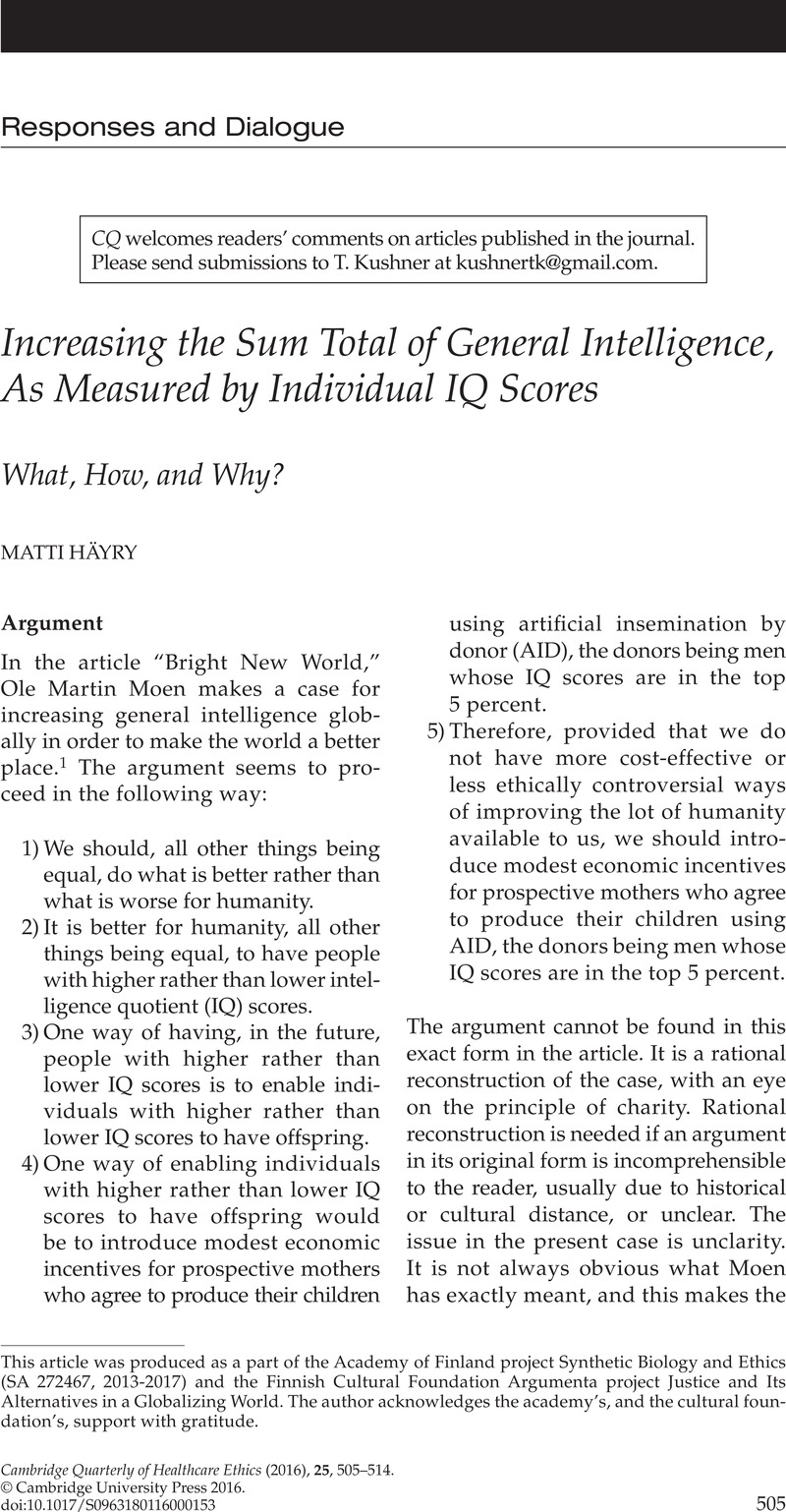Article contents
Increasing the Sum Total of General Intelligence, As Measured by Individual IQ Scores
What, How, and Why?
Published online by Cambridge University Press: 27 June 2016
Abstract

- Type
- Departments and Columns
- Information
- Copyright
- Copyright © Cambridge University Press 2016
References
Notes
1. Moen, OM. Bright new world. Cambridge Quarterly of Healthcare Ethics 2016;25(2):282–7.CrossRefGoogle ScholarPubMed
2. The meaning of these concepts, as I use them here, has been further explained in Häyry, M. Rationality and the Genetic Challenge: Making People Better? Cambridge: Cambridge University Press; 2010;CrossRefGoogle Scholar and Häyry, M. What do you think of philosophical bioethics? Cambridge Quarterly of Healthcare Ethics 2015;24:139–48.CrossRefGoogle ScholarPubMed
3. With the proviso that the “all other things being equal” of premise 1 is, after the specifications made in premises 2–4, equivalent with the “provided that we do not have more cost-effective or less ethically controversial ways of improving the lot of humanity available to us” of premise 5.
4. See note 1, Moen 2016, at 283.
5. For an illuminating exchange on the elusiveness of intelligence and its biological bases, see, e.g., the discussion instigated by Johanna Ahola-Launonen’s blog post “Bad News for ‘Intelligence Genes,’” available at http://blog.practicalethics.ox.ac.uk/2014/09/bad-news-for-intelligence-genes/ (last accessed 5 Oct 2015). Philosophical literature is rife with speculations on the matter.
6. See note 1, Moen 2016, at 282–3.
7. See note 1, Moen 2016, at 283.
8. Monahan M, Boelaert K, Jolly K, Chan S, Barton P, Roberts TE. Costs and benefits of iodine supplementation for pregnant women in a mildly to moderately iodine-deficient population: A modelling analysis. Lancet Diabetes & Endocrinology 2015;3:715–22. Moen does not refer to this study in the article.
9. See note 1, Moen 2016, at 283.
10. See note 1, Moen 2016, at 283.
11. See note 1, Moen 2016, at 282.
12. See note 1, Moen 2016, at 284.
13. See note 1, Moen 2016, at 285.
14. See note 2, Häyry 2010, for an analysis of the responses of science enthusiasts to moral, social, and political criticism.
15. See note 1, Moen 2016, at 285.
16. See note 8, Monahan et al. 2015.
17. See, e.g., Iodine supplements could help mums, babies and the economy. NHS Choices 2015 Aug 10; available at http://www.nhs.uk/news/2015/08August/Pages/Iodine-supplements-could-help-mums-babies-and-the-economy.aspx (last accessed 5 Oct 2015).
18. Cf. the suggestion that “parental love almost always prevails” by Green RM. Babies by Design: The Ethics of Genetic Choice. New Haven, CT: Yale University Press; 2007, at 114.
19. See note 2, Häyry 2010, at 134–8, for a development of these points in another reproductive context, human cloning.
20. See note 2, Häyry 2010, at 89, for a formulation of the point in another context, planned deafness in children.
- 1
- Cited by


